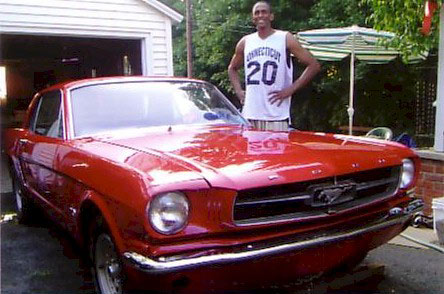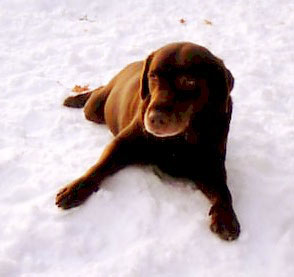Murray Williams was a
Forward for the UConn Huskies from 1987 – 1991. In August of 2005, I had
the opportunity to meet with Murray in his hometown of Torrington, CT
where he reflected on his childhood as an athlete, his time at UConn, and
he shared some post-collegiate experiences.
As the youngest of six children in the Williams family, it wasn’t until he
reached his early teens that his height took over, leaving his dream of
playing with the Yankees in the dust while he discovered his basketball
skills. Murray pursued the winter sport throughout his years at Torrington
High School. By his sophomore year he was six feet five inches tall,
realizing he still had a chance of growing as tall as his older brother
Loran, who was six feet eight inches tall. Murray was averaging 20 points
per game, and he impressively scored his 1000th point as a junior. Around
the same time he began receiving what would total more than 80 letters
from colleges expressing interest in recruiting him. “It was interesting
receiving all that attention. I had no clue about college.” he said. “I
didn’t like school, and I didn’t have any intention of going to college. I
never thought I was that good.”
The University of
Connecticut was, at that time, hardly on the basketball map, and was among
the ranks of Boston College, the University of Southern California, and
the University of Hawaii in approaching Murray about playing for them. The
final decision came down to staying a bit closer to home, coupled with the
feeling of community Murray said he felt when he spent a weekend visiting
with the players in Storrs. The choice to attend UConn is particularly
notable in that his parents were adamant he attend Iona College, located
in New Rochelle, NY. “It was the first time I had defied both of my
parents, and that was the most significant thing about the whole process,”
he said.
At UConn, Murray said moving up to such an elevated talent pool was
refreshing, as he was then among people of a similar ability. He adapted
to the idea that each player takes a specific role, and not all players
are given a green light to shoot as much as possible. Coach Calhoun’s
system rewarded those who practiced hard, and consequently Murray started
22 games his freshman year. “Other teams – Georgetown, Syracuse – were
more talented, but no one worked harder or wanted to win more than UConn.
We always believed, going into every game, that we could win it. That’s
one thing coach Calhoun instilled in all of us, and he still has the same
philosophy.”
Asked about his most memorable moments in a UConn uniform, Murray said
cutting the net after winning the National Invitational Tournament in
1988, and contributing to the first Big East Championship win in 1990 were
both memorable and satisfying. As a student on campus, Murray was
surprised by the reception from other students as being something special.
“You were known as a basketball player. Your identity was something you
couldn’t hide.”
 After losing both of his parents while at UConn, Murray became
academically ineligible to play basketball, and left the university
without earning a degree. He played for the New Haven Skyhawks, a United
States Basketball League team, coached at Oliver Wolcott Technical School,
a high school in Torrington, and then played for just under a year in
England and Ireland, where “I got a chance to tie up my career and finish
on my own terms.” he said. “When I returned I was 15 credits short of a
degree,” he continued. “After my parents died, basketball became third
fiddle; I didn’t care for anyone telling me what to do at that time, or
about school… I went into my own world for awhile, and when I emerged I
was back with no degree. I said I had to get that piece of paper for my
parents, and to better my position.” After losing both of his parents while at UConn, Murray became
academically ineligible to play basketball, and left the university
without earning a degree. He played for the New Haven Skyhawks, a United
States Basketball League team, coached at Oliver Wolcott Technical School,
a high school in Torrington, and then played for just under a year in
England and Ireland, where “I got a chance to tie up my career and finish
on my own terms.” he said. “When I returned I was 15 credits short of a
degree,” he continued. “After my parents died, basketball became third
fiddle; I didn’t care for anyone telling me what to do at that time, or
about school… I went into my own world for awhile, and when I emerged I
was back with no degree. I said I had to get that piece of paper for my
parents, and to better my position.”
Murray returned to UConn and earned a degree in Communications. At 28, he
was offered a job as a case worker for an organization in Torrington that
provides services to chemically addicted and/or mentally ill clients. He
has since been promoted, and is now a psychiatric supervisor for the same
organization. “I’m a communications guy and I thought I would be doing a
radio sports program. It’s by chance that I got an interview (with his
current employer) and was hired with no experience. I don’t regret not
following the radio or T.V path. It’s neat to give back and help get
people reestablished in life, and at the same time get treatment for
people. It’s challenging and frustrating, but it’s rewarding.” Murray said
he is open to TV and radio positions if they arise.
During the 2004-2005 basketball season, Murray had the opportunity to be
featured in a television commercial, and a print ad for the University of
Connecticut Continuing Education Program. The commercial played during the
UConn men’s and women’s games of CPTV, and the Fox Network, and the print
ad was in several state papers.
The message of the ad was “you may have forgotten me, and now fifteen
years later my basketball days are long gone but you’re never going to be
able to take the degree away from me. It’s about athletes succeeding
athletically but it’s also about athletes succeeding in life, and getting
that degree, being a successful and productive person.”
Murray also had the opportunity in 2005 to work with Rich Coppola in the
Fox 61 television studio where he did a live analysis of the UConn/West
Virginia game. Murray received positive feedback from television viewers,
and would welcome the opportunity to work in the television studio to do
more live analysis in the future.
Murray is a man of many talents. He also owns a car detailing business
where he details cars at the owner’s home making it convenient, without
interruption to the car owner. His pride and joy is his 1965 mustang that
he and his brother, Rene are restoring. They hope to have it completely
finished and ready for the road by next summer.
Murray also continues to play some basketball on the Chris Smith CT All
Star basketball team. A team that plays at CT charity fund raising events,
and he plays in local basketball leagues.
Murray will soon be living in his new custom built home in Torrington where he is taking the time to
modify a few things like having the door jams four inches taller than regulation, and with a workout room
that has a 7 foot ceiling.
Murray’s thoughts on the 2005-2006 team are that they need to focus on
fundamentals and back to basics. “They need to realize how important the
#1 position (point guard) is on the floor. Whoever it is they will be the
key to the team, in how far they advance, and what is going to happen in
the end. If everyone plays their roles, we could be cutting down the nets
again this year.” (referring to winning the National Collegiate Athletic
Association Tournament). Murray plans to be at the NCAA Final Four
Tournament in Indianapolis, Indiana if UConn makes it there.
This year the teams in the Big East League will be knew but Murray thinks
UConn will do well against the new teams coming in; Cincinnati, Marquette
and DePaul to name a few. Murray is very happy for all the success that
Coach Calhoun has had, and he was planning to attend Coach Calhoun’s
induction into the Springfield Basketball Hall Fame ceremony in September.

In memory of Mocha 12/96 - 6/06
|
